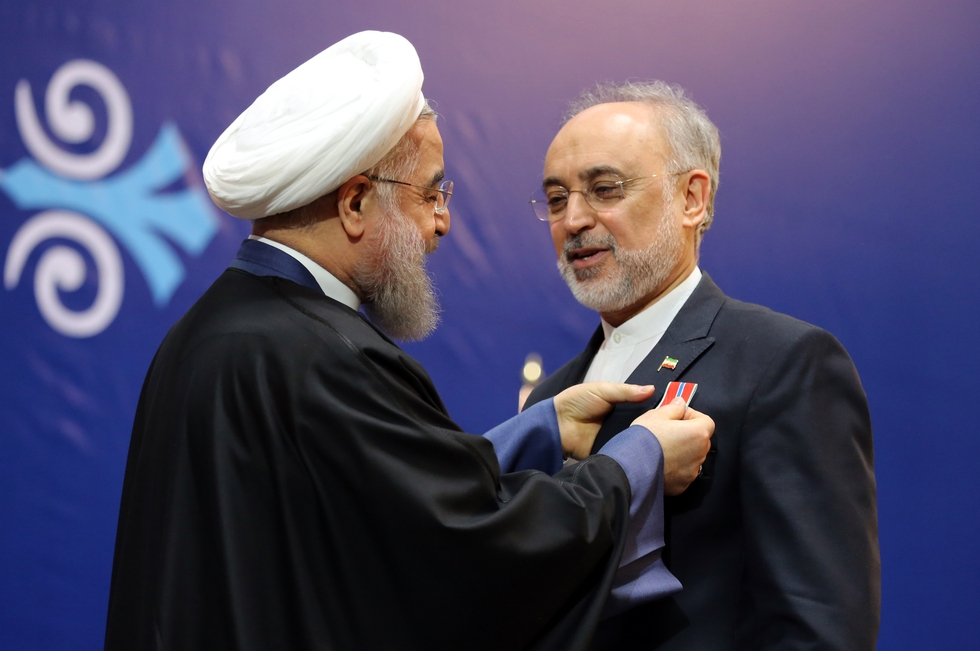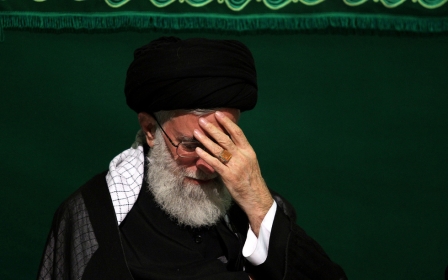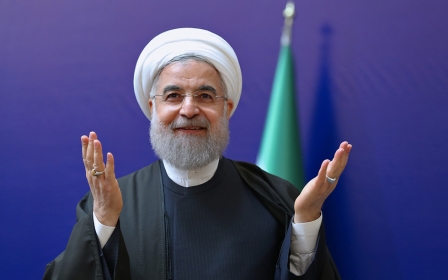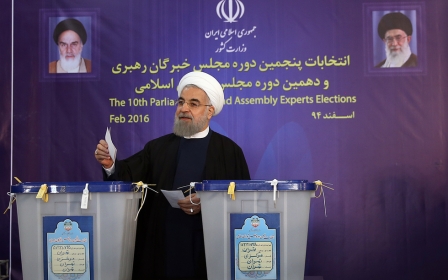Iran's not benefiting from the nuclear deal, and that’s not good for Rouhani

When Iran and the six major global powers reached an agreement last summer to put an end to the controversy surrounding Tehran’s nuclear programme by announcing the conclusion of the Joint Comprehensive Plan of Action, Iranians flocked to the streets en masse, celebrating and rejoicing at what they believed would be the emergence of a new horizon in their lives.
Most of them were youths, and the freshness of their teenage years had been spoiled by the adventurous policies of the former hardline president Mahmoud Ahmadinejad, who failed to fortify Iran’s oil-dependent economy in the years when the price of crude oil was at its all-time high and the nation allegedly earned something between $531bn and $800bn in oil revenues, all of which was literally frittered away due to mismanagement. During those turbulent years, corruption and embezzlement plagued the country like an infectious disease and foreign relations were aggravated as a result of Ahmadinejad’s inability to resolve the nuclear dilemma in a reasonable and sound manner.
The nuclear deal offered a glimmer of hope amid all the darkness that had overtaken the country. People had come to believe that more than a decade of gruelling sanctions that had paralysed their lives would be terminated, as world powers promised to annul all the economic penalties they had imposed on Iran over its nuclear activities. Iran mutually committed that it would disband the sensitive parts of its nuclear programme as a confidence-building measure to demonstrate that it would not pursue nuclear weapons.
This breakthrough accord, which some global observers named as a successful example of peaceful settlement of diplomatic standoffs and a milestone in nuclear non-proliferation, was a result of President Hassan Rouhani's and Foreign Minister Javad Zarif’s craftsmanship, and a testimony to President Barack Obama’s commitment to pursuing diplomacy with Iran. Beyond that, both President Rouhani and President Obama had defied the deafening cries of hardliners and hawks at home who were using every muscle to ruin the negotiation process and ensure that the nuclear deal, a sign of wisdom and rapprochement between the two arch-foes, would not come to fruition. But they were beaten by the seriousness and sincerity of the two leaders who were intent on sealing the much-awaited agreement.
The nuclear deal was a promising sign of change in a region afflicted with tensions, violence and insurgency, and when it was inked, President Rouhani was showered with congratulatory messages from his counterparts from the four continents who hailed this diplomatic opening and talked of their ambitions for starting a new path of engagement with Iran in the post-JCPOA, post-sanctions era. Everybody was happy, and everybody imagined a successful implementation of the deal – there was no reason for it not to work.
Now, about five months after the official implementation of the deal, Iran has reportedly kept its word, delivered on its commitments and curbed its nuclear programme in line with the technical provisions of the JCPOA. This is certified by the International Atomic Energy Agency that has confirmed Iran’s compliance with the deal. And even though diplomatic exchanges have been going on heatedly following the announcement of the Implementation Day on 16 January, manifested in the historic, first-time visits to Iran of the leaders of countries such as Greece, Ghana, Switzerland, Italy, South Africa, South Korea and Croatia, the dollars that were supposed to be filling Iran’s pockets are not coming, and in a nutshell, Iran is not benefiting from the nuclear deal tangibly.
What is happening is that the United States, which has through decades enmeshed itself in a web of multifarious, complicated sanctions against Iran, has failed to abide by its part of the bargain, and as a result of its secondary sanctions – which are still in place - the banking transactions between Iran and the European countries are virtually non-existent or taking place slothfully. As a result, Tehran is not able to access its frozen assets abroad and bring home its blocked oil revenues, including a gigantic $6.5bn which India owes to Iran for the crude it purchased from the oil-rich Persian Gulf country over the past years; a debt that has not been settled yet due to the international banks’ inability to process payments to Iran.
The facilitation of banking deals is pivotal to the successful enforcement of the nuclear agreement. If Iran simply keeps on restraining its nuclear programme – a super-expensive programme which has been equated with national sovereignty and dignity by the conservatives in Tehran – while not receiving any economic incentive, then would there be any point in the maintenance of such a pact?
Iran has agreed to 24/7 inspection of its nuclear facilities, something which President Obama described as being unprecedented in the history of nuclear inspections, and in return, the US has dismally failed to show that it equally has a vested interest in keeping the deal alive. And as said by several Iranian officials, is not doing enough to ensure that the international community’s legitimate trade with Iran goes on unimpeded.
Over the years, European banks have paid billions of dollars in penalties for their collaboration with Iranian financial institutions, which was at times considered a violation of US sanctions. In the most notorious case, French PNB Paribas paid $8.9bn in fines over breaching the Iran sanctions, and it really does not wish to get such harsh sentences again. As a result they approach Iran extremely cautiously, despite the fact that the nuclear deal lays down the conditions of legal trade with Iran quite clearly, and all the UN Security Council resolutions against Iran have been scrapped.
Iranian foreign minister Javad Zarif has been pressuring his US counterpart John Kerry to come out and state expressively that the United States will not obstruct legitimate trade with Iran, and the European banks and financial institutions should not be fearful of handling monetary transactions with Iran. In response, John Kerry has travelled the world – and sent his representatives to different countries – to explain to banking institutions that the US will not stand in the way of their business ties with Iran in the aftermath of the nuclear deal and they should discard their reluctance for working with Tehran. After all, the global reputation of the United States would be at stake if the deal begins to unravel due to its failure in honouring the terms of the JCPOA.
The hardliners in Tehran are already honking horns and clamorously calling for the dismantlement of the nuclear deal, as they claim the United States has violated it. The termination of the nuclear deal would be the best-case scenario for them, and quite honestly would endorse every hawkish Republican in the US presidential race who would promise to rip up the nuclear deal if elected to the White House. That is why they were whispering praise for Donald Trump after he announced that he would also tear up the “disastrous” nuclear deal with Iran if elected president.
For the hardliners who are hell-bent on toppling President Rouhani, the malfunction of the nuclear deal would be the best news. They sincerely want this agreement to end in vain, as they were opposed to it since the early days of November 2013 when Iran and the United States sat together for the first time in some four decades to solve a common challenge and shift their strategy from squabbling and not talking to each other to wise, mature diplomatic engagement. And the conservatives in Iran’s outgoing parliament and other power centres are instinctively opposed to any sort of dialogue with the United States for vague reasons.
For the moderate President Rouhani, the collapse of the deal is tantamount to the transformation of his four-year term signature achievement into an Achilles heel that can risk his reelection in next year’s presidential vote, which will more than likely feature Mahmoud Ahmadinejad’s comeback to Iran’s political scene.
Ahmadinejad is gearing up to announce his presidential bid sometime next year, and he is speaking quite forcefully. He has reportedly promised that he will quintuple the monthly cash subsidies for every Iranian citizen and is said to have plans for travelling to 15 Iranian provinces by the end of this Iranian year (ending 20 March, 2017) on lecture tours. These would be in effect his early campaign activities for next year’s poll.
Now, there is a hard truth which all the parties involved in the nuclear deal, and all the parties benefiting from it, need to embrace: if the West cannot honour its commitments as promised under the JCPOA and refuses to take the steps that concretely benefit Iran’s damaged economy, the hardliners in Tehran will have the pretext to intensify their propaganda campaign against Rouhani and the entire reformists camp, that recently made significant gains in the legislative elections, and lay the groundwork for defeating him in next year’s crucial race for presidency.
Their propaganda crusade, which has already started, will be aimed at instilling the conviction that President Rouhani has been unable to cure the nation’s economic woes, and his initiative for direct negotiations and rapprochement with the United States was fruitless and unproductive; and the country would need a true revolutionary like Mahmoud Ahmadinejad to come back and solve the problems through his assertive, uncompromising approach and resistance against the “bullying powers”. This would also mean perhaps scrapping the nuclear agreement.
The hardliners dominate state TV, and the public sphere is easily influenced by their indoctrination. They can easily manipulate next year’s vote and unseat President Rouhani if the Iranian citizenry do not perceptibly feel the impact of sanctions relief and the full enforcement of the nuclear deal. This will be a blow not only to Rouhani and the reformists, but to more than two years of committed diplomacy to end an unnecessary crisis and introduce the first steps of reconciliation between two sworn enemies.
- Kourosh Ziabari is an award-winning Iranian journalist and media correspondent. He is staff writer with Iran Review and a reporter with the California-based Fair Observer. He has also contributed to Huffington Post, Your Middle East, International Policy Digest, Gateway House and Tehran Times.
The views expressed in this article belong to the author and do not necessarily reflect the editorial policy of Middle East Eye.
Photo: Iranian President Hassan Rouhani (L) awards Ali Akbar Salehi, the head of Iran's Atomic Energy Organisation, with the Medal of Honour for his role in the implementation of a nuclear deal with world powers, on 8 February, 2016, in Tehran (AFP).
New MEE newsletter: Jerusalem Dispatch
Sign up to get the latest insights and analysis on Israel-Palestine, alongside Turkey Unpacked and other MEE newsletters
Middle East Eye delivers independent and unrivalled coverage and analysis of the Middle East, North Africa and beyond. To learn more about republishing this content and the associated fees, please fill out this form. More about MEE can be found here.





